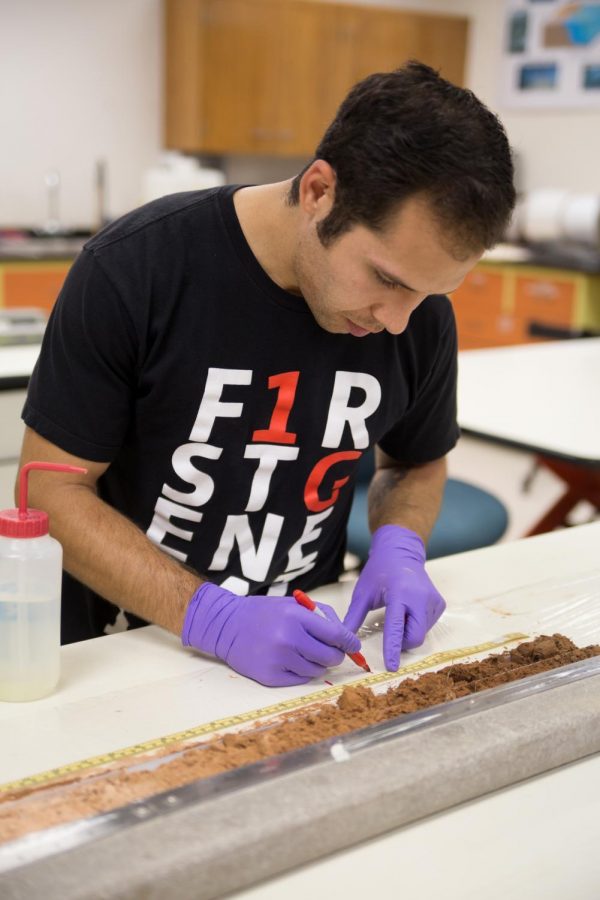OSU enrolls thousands of students in Graduate School
June 12, 2017
As one of the only institutions in the nation designated as a land, sea, sun and space grant university, Oregon State University is dedicated to creating an environment centered around academic excellence, specifically through research. One of the leading ways OSU students can get involved in research is by enrolling in the Graduate School.
As of the most recent enrollment report in winter 2017, the unduplicated headcount of graduate students was 4,293, according to Rosemary Garagnani, the assistant dean of the Graduate School at OSU. Additionally, in fall 2017, 223 of newly enrolling graduate students had prior OSU degrees.
OSU’s Graduate School currently offers 85 majors, including graduate certificates, with the largest number of graduate students in the College of Engineering, according to Garagnani.
“Our staff often refers to the difference between undergraduate and graduate study as the transition from being a consumer of knowledge and information to being a creator of knowledge. Graduate study is available in many varieties, including degrees comprised of coursework only, master’s degrees requiring a project or theses and doctoral degrees,” Garagnani said in an email.
The OSU Graduate School also offers graduate-level certificates, which are shorter time commitments, on the Corvallis campus, as well as the Cascades campus and through the Ecampus.
Before becoming the OSU summer session marketing program manager, Ali Duerfeldt was enrolled in OSU’s College Student Services Administration graduate degree program, where she completed her master’s of education. According to Duerfeldt, she wanted to pursue graduate school because she wanted to specialize in working with students in higher education, and graduate school would allow her to gain experience in the field of student affairs, through both classroom learning and practical applications.
She chose OSU for graduate school because of the cohort model of learning, which allowed her to pursue her degree alongside a small group of students, according to Duerfeldt.
“It created a strong sense of community within the program,” Duerfeldt said in an email. “Additionally, Oregon State stood out to me because of its commitment to inclusivity, diversity and social justice, which were vitally important components of the type of community I was looking to be a part of.”
Those within the group Duerfeldt worked with ranged from students moving directly from undergraduate programs to graduate school, to individuals who have already been working in their field for some time, according to Duerfeldt.
“The diversity within my cohort helped me to become a better practitioner and generally a better person, learning from so many different types (of) people and their unique perspectives,” Duerfeldt said via email.
Attending graduate school, according to Duerfeldt, helped set her apart from others entering the workforce and made her a more competitive applicant for the jobs she was interested in.
“The depth and breadth of my graduate program had an immediate impact on my success in my career, as I had a strong foundation to build from. I felt competent and confident to pursue my professional goals, because of my time in graduate school,” Duerfeldt said in an email. “I had such a positive experience as a graduate student at Oregon State that I returned a few years after graduating to take a full-time job here.”
Adrian Gallo, a current graduate student, recently completed his master’s degree in sustainable forest management, and is now working toward a Ph.D. in crops and soil science. Gallo has been studying soil science since his undergraduate years at OSU.
“I was very lucky to find something that I enjoyed that challenged me right from the beginning of my undergraduate career,” Gallo said.
According to Gallo, he decided to attend graduate school because of the vast amount of information he learned during his time as an undergraduate student.
“I did take five years, but I doubled (majors) so I think it was worth the extra year,” Gallo said. “However, my curiosity was not satisfied. By the time I was taking the 400 and 500-level classes, I realized that ‘Yes, I can get a job and I wouldn’t have a problem finding a job, but I would not be intellectually satisfied.’”
When making the decision to enroll in graduate school, according to Gallo, it is important to study a field you are interested in and want to learn more about.
“Don’t come into graduate school thinking you’re going to be making big bucks because you have a higher degree. Don’t come into graduate school because you want the higher degree, because you want the initials in front of your name,” Gallo said. “Come into graduate school because you’re curious about something you’re passionate about.”

















































































![Newspaper clipping from February 25, 1970 in the Daily Barometer showing an article written by Bob Allen, past Barometer Editor. This article was written to spotlight both the student body’s lack of participation with student government at the time in conjunction with their class representatives response. [It’s important to note ASOSU was not structured identically to today’s standards, likely having a president on behalf of each class work together as one entity as opposed to one president representing all classes.]](https://dailybaro.orangemedianetwork.com/wp-content/uploads/2025/03/Screenshot-2025-03-12-1.00.42-PM-e1741811160853.png)
























